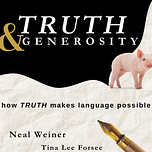Hello everyone!
News, Updates, etc.:
I’ve added a new Welcome Page, which will be the first thing people see when they arrive at my Substack. It occurred to me that many people find Substack confusing—it is confusing!—so I thought it would be nice to have an anchor post giving people some sense of what I’m up to here.
Here’s a little movie teaser for this post:
That’s it for now. Thanks for reading!
—Tina
PART III: Generosity and Truth
WE HAVE SEEN HOW language begins in trust and would not be possible without a vast body of shared belief. In the next chapter we will see why we are justified in calling our beliefs true. From there we will sketch an outline of a system of beliefs based on what we have said thus far about generosity.
We will take the principle of generosity into increasingly greater conceptual landscapes—from poetic interpretation to literary analysis to scientific understanding—to speculate on what features might be common to them all.
12
The Body of Truth
ARE WE JUSTIFIED in dropping the word belief and replacing it with truth? If it merely so happened that we agreed about certain matters, we would have no right to do this. As Davidson himself puts it, mere “agreement, no matter how widespread, does not guarantee truth.” But the shared beliefs we are talking about are not merely widespread agreement—they form an absolutely necessary agreement that is the condition for the possibility of recognizing language and intelligence as such. Such beliefs are not merely uncontested or not contradicted; they are not, as a mass, contradictable. Thus the indispensable body of belief may be undefined, but it is on the whole and for all practical purposes, infallible. Which is to say, to contradict them in their entirety and in their very possibility is to contradict oneself. And so for us, the undefined body of belief must be taken, on the whole, as true.
Listen to this episode with a 7-day free trial
Subscribe to Philosophy and Fiction to listen to this post and get 7 days of free access to the full post archives.








